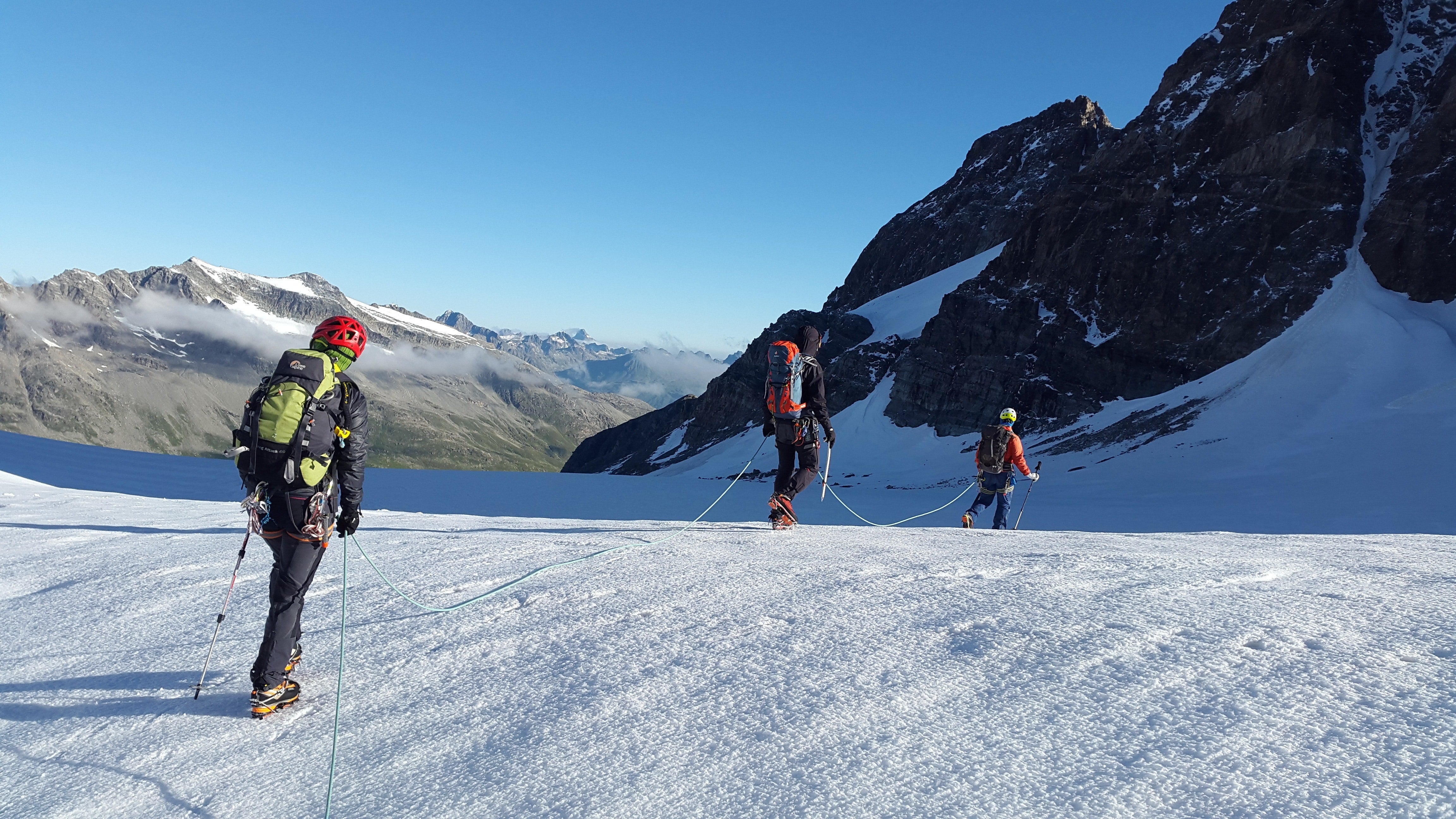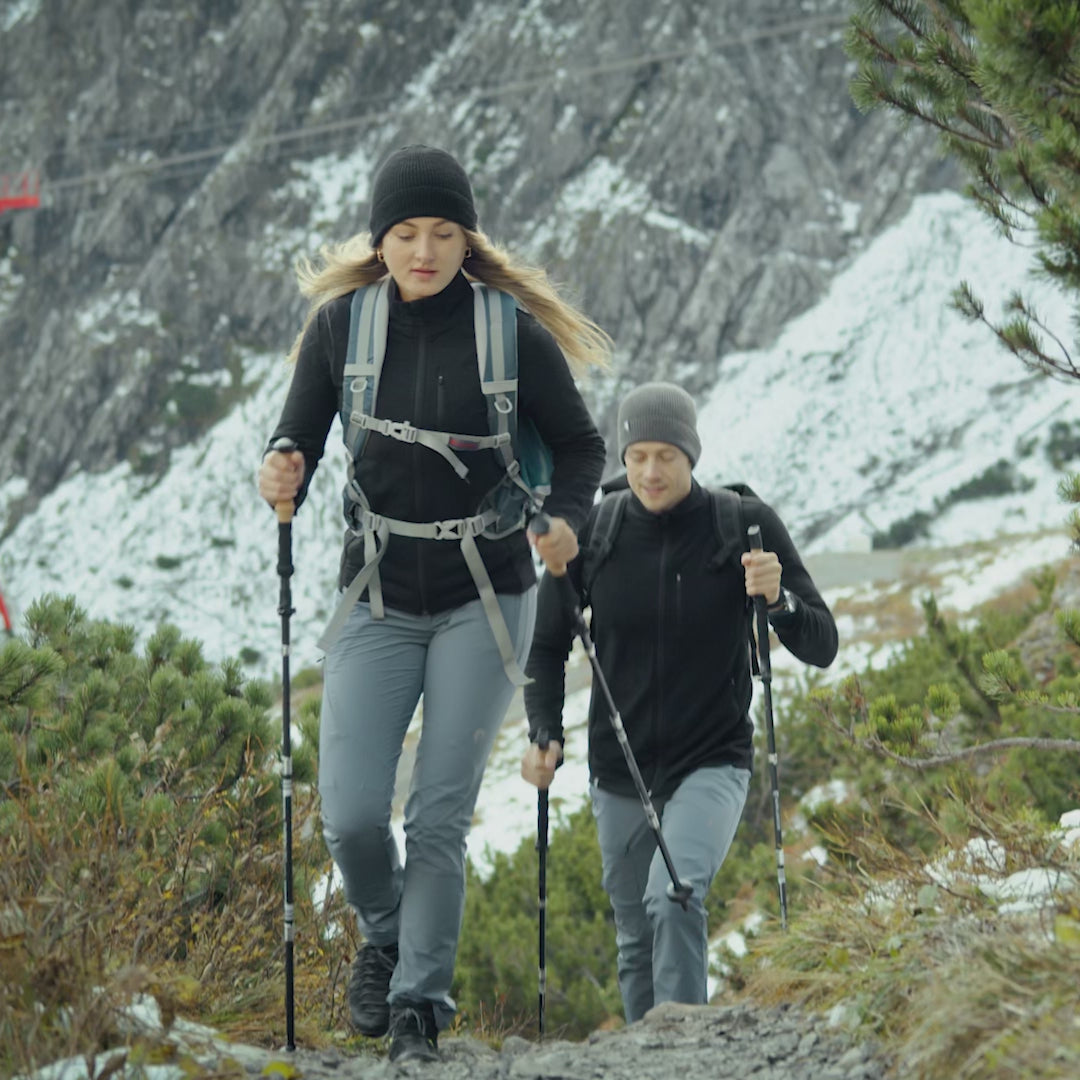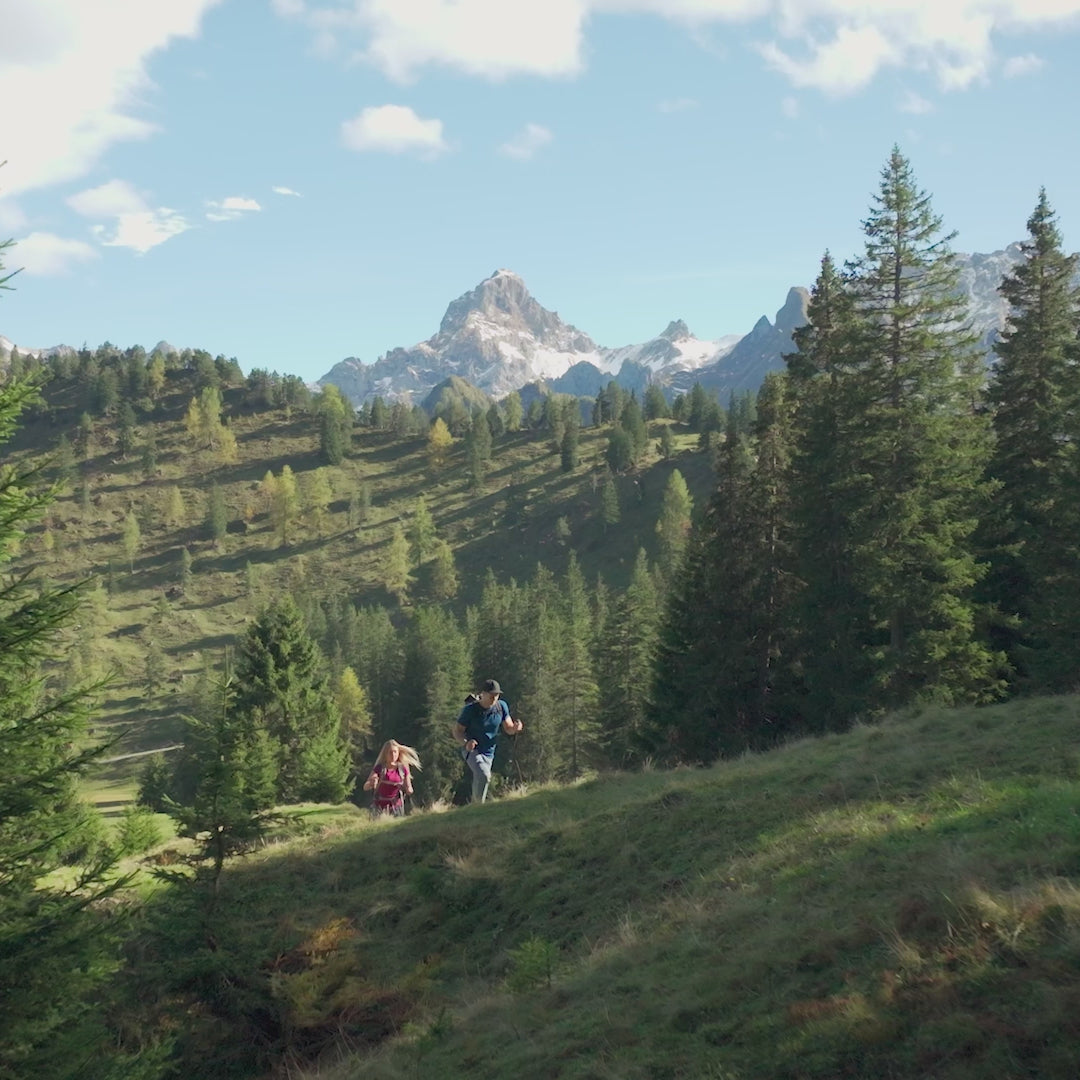Dhe idea behind trekking poles is to support footwork and balance. Trekking poles offer knee protection and balance, but there are a few points you should bear in mind when using hiking poles correctly.
When are walking poles useful?
Experienced and sure-footed walkers can use poles in places to take the strain off their knees and improve their balance. Nevertheless, the body should also have the opportunity to move freely without poles often enough to gain balance experience. When the trekking poles are not in use, they should lie loosely in the hand and be held centrally so that they do not get in the way.
Hiking poles are absolutely unsuitable for steep or exposed terrain. They can even become a deadly danger in the event of a fall.
What walking pole techniques are there?
There are three pole techniques in total:
1. The diagonal technique: On less steep terrain
right pole, left leg.
2. The double pole technique: On higher steps up and down
Here, both poles are placed clearly in front of the body and feet, then you walk between them in two to four steps. On steep cross-paths, it is a good idea to hold the poles at different heights: On the uphill side below the handle, on the downhill side you can lean on the pommel.

In the double pole technique, both poles are placed in front of the body.
3. the side support method: for extremely steep terrain
You can hold one or both poles. Grip the pole with your uphill hand close to the tip and with your downhill hand approximately two thirds of the way up or at the handles. Now place the tip in front of your body to the side and at about hip height on the slope. The uphill arm is stretched out and the body is supported on this side, the other hand presses the poles against the slope. Take two steps, then repeat the whole thing.

Side support technique: Here you use the poles to support yourself sideways on the slope.
Important: When descending, the poles will only take the strain off your knees if you place them parallel in front of your body. This involves bringing your upper body forward and bending your legs in order to place the poles far forward and down.
This pole use is only done every two to three steps. On steep slopes, the walking poles must be set a little longer on the descent.
This pole insert is only done every two to three steps.
When should trekking poles not be used?
In rocky terrain where there is a risk of falling, poles should be in your rucksack. They absolutely do not belong on your wrists. If you attach hiking poles to the outside of your rucksack, you should make sure that they are attached correctly. Otherwise they can become an obstacle and get caught on rocks, for example.
Stick bows
The hiking pole loops should really only be used on completely flat terrain. If your hands are in the pole loop and you stumble, you are tied up and can neither hold on nor support yourself.

The loops can be omitted completely or included with the handle.
Related blog posts
Everything you need to know about hiking poles
Hiking poles are much more than just cool equipment. They offer you numerous advantages and make your hike an absolute highlight. However, there are still some prejudices and misconceptions.
The following blog post brings light into the darkness. Learn:
- What health benefits hiking poles have
- How to use trekking poles
- Which sticks suit you best
- How to adjust the poles
- What transport options are there?
- How you can recognize good hiking poles
Are you more of a video type? No problem, we go into the topic in detail in our buying advice
Video advice on hiking poles " How to find the right hiking poles
Why are hiking poles useful?
You have probably often asked yourself: "When are trekking poles even useful?" Why someone uses hiking poles can have very different reasons. In principle, they have Hiking poles many positive characteristics and advantages:
1. joint support
Hiking poles have a relieving effect
- feet,
- Legs,
- Knee
- and back.
Especially when walking downhill the knee will be very heavily loaded. By using your mountaineering poles, you save energy, your concentration doesn't wane so quickly, and you are safer when descending.

2. balance
Most accidents while hiking happen through slipping or stumbling. If you are also tired and your concentration drops, the risk of falling is even greater.
The hiking poles are like extensions of your arms that support you and give you better grip. This gives you additional stability and improves your sense of balance.
3. posture and breathing
Hikers who use trekking poles can simultaneously improve their posture. If you have a severe... Outdoors Backpack If you carry it on your back, the sticks support your upright posture. This relieves your spine in the best possible way.
Hiking poles namely provoke the walk in upright posture. It is almost impossible not to walk upright with hiking poles.
- Your shoulders cannot 'collapse' in front.
- In addition, the upright posture promotes breathing. You can breathe more easily.
Expert tip: Conscious breathing is essential in endurance sports so that you can concentrate for longer, you don't get tired so quickly and therefore remain accident-free.
4. security
As you can see from the previous points, hiking poles help you in many ways. You can stay accident-free for longer by...
- Your joints supported,
- promote your balance,
- You don't put additional strain on your posture, but rather promote a healthy posture.
In general, this walking aid has a positive effect on your energy balance, so you can really enjoy walking when hiking in the mountains with sticks.
5. nordic walking
The dynamic movement of Nordic walking
- strains the heart and circulation,
- stimulates metabolism,
- strengthens muscles and bones
- and tackles excess pounds.
If you diligently swing the mountaineering poles back and forth, you will also strengthen your arms, shoulders and back.

Step-by-step instructions: adjust hiking poles correctly

Step 1: Choose the right hiking poles
Before you adjust the hiking poles, it is important that you choose the right model for your needs. Pay attention to the length, material and handles of the poles to ensure they fit your height and hiking style.

Step 2: Determine the optimal length
TheHikingpoles should become demAdaptedto terrain. The poles should be slightly longer when descending and slightly shorter when ascending. As a rule, however, the mountaineering poles should be set as long as
- that the hand can easily grasp the handle,
- while the arm is at a right angle to the floor.
- The forearm is parallel to the floor and bent at the elbow.
Which hiking poles for which body size?
Many companies offer guidelines for the correct length for height. However, how a stick is adjusted can be very individual. As described above, it is important that the basic setting is at a right angle.
How long should Nordic walking poles be?
Since this question often arises specifically for Nordic walking poles, we will address this question separately here.
- The distance between the stick and your body should be about half an arm's length.
- When your arm is bent at a 90 degree angle, the sticks should end at your forearms.
- The 90 degree principle is exactly the same as with conventional "trekking poles".
- Additionally there is the method for calculating the length. To do this, multiply your height in centimeters by 0.7. The result is the stick length.

Step 3: Adjust the height of the hiking poles
Look for the adjustment mechanism on your hiking poles. This can be a twist lock, a folding system or a snap lock. Loosen the clasp to adjust the poles. Pull or push the telescopic rods to adjust the desired height. Make sure the marks on the pieces match to ensure both sticks are set at the same height.

Step 4: Adjust the hand straps
Hiking poles usually come with hand straps that allow you to hold the poles without tightly gripping them. Slip your hand through the loop and adjust the size of the loop so that it fits comfortably. You should adjust the strap so that you can easily slide it in and out without it being too loose or too tight.

Step 5: Check the tips
Check the tips of your hiking poles to make sure they are intact and sharp enough to provide good grip on various surfaces. If necessary, you can swap out the tips or replace worn tips.

Step 6: Test run and fine adjustment
Before you go on a longer hike with the hiking poles you have adjusted, do a short test run. Take a few steps and check that the length and settings are comfortable and feel good. Adjust settings as needed to achieve the optimal hiking experience.
How do you walk properly with hiking poles?
When hiking, we often just start walking without thinking about our walking technique. This is not surprising either. After all, our running is automated.
However, if you have the full If you want to use the potential of your trekking poles, you should pay attention to a few points when using them:
1. adjust the size correctly
First of all, adjust your hiking poles to the correct size. See our step-by-step instructions.
2. hold the handle correctly
A common mistake is the wrong grip, where the loop is often simply threaded from above. You should correctly reach through the loop from below so that you can exert pressure on the pole even with an open or loose hand.
This allows you to open your hands during the backswing without sacrificing any relief.
Expert tip: To prevent your hands from cramping up, you should make sure to keep your grip loose when making the swing.
Important: The loop should only be used on relatively flat terrain. If you fall and become entangled, you will not be able to grab the handle or support yourself. The risk of injury is therefore much higher.
3. correct posture
To achieve the best possible effect, it is advisable to always hold the sticks close to your body. On flat terrain, the poles are diagonal to the legs and are used alternately, according to the natural movement pattern.
4. walking on steep terrain
In steep terrain, double-decker use is the variant you should use. When ascending and descending, the poles are usually placed every other step and you push yourself up powerfully with both arms. This ensures stability and relief.
5. go downhill
The double-deck technique is also the best choice when going downhill. You should not drill the tips of the poles into the terrain, but rather grip or hold the handle so that you can perform a clean technique. This way you don't slip and avoid falls.
6. crossings
When crossing, poles do not necessarily have to be adjusted differently. It is enough if you hold the uphill pole below the handle and on the downhill side grasp the handle like a knob from above.
7. very steep terrain and traverses
You should pass through very steep terrain and traverses without using loops. The stick should 'only' be used as a support. There is also the option of holding a stick with both hands.
"It's an old method, the way mountaineers did it back then. According to Wolfgang Loacker, experienced mountain and ski guide in Montafon."
In principle, you should only walk on steep terrain if you are fit enough and have experience, or have an expert with you.
Attach folding sticks to the backpack
On some stages or on buses and trains you don't need your hiking poles. Folding sticks have a decisive advantage here.
They can be folded up in no time and are extremely easy to transport due to their small pack size and weight. This is what you should know about transporting your hiking poles:
The sticks in the backpack
Ideally, you should not attach any equipment to the outside of the backpack.
"It is safer to keep trekking poles in your backpack. On the one hand, they can easily get lost and if you fall, the risk of injury is higher," says Wolfgang Loacker, Austrian mountain and ski guide.
In addition, mountain hiking is done with sticks Hiking backpack are attached, more difficult and dangerous. The weight pulls backwards and downwards. This puts strain on your spine and takes strength.
The tip on the backpack
The attachment option depends very much on your backpack. In most cases, trekking and hiking backpacks have loops and hooks that make it possible to insert and thread the poles.
For loops (the tip) is inserted at the bottom. The small loop is used for sticks without plates, and the large loop is used for sticks with plates.
The plates usually prevent the stick tips from slipping. Otherwise you can Stick plate can also be turned down in just a few steps.
Compression straps
Compression straps are mostly loops on the right or left of the backpack that can be tightened. The hiking poles are, so to speak, enclosed and tightened. This means your poles don't swing back and forth and sit firmly and securely on your backpack.
Velcro and cable ties
An alternative are external Velcro fasteners and cable ties to secure hiking poles to the backpack. These methods require that you already have an existing system on your backpack where you can thread your external Velcro or cable ties. Especially the Velcro method is only for him Suitable for transport.
How do I transport hiking poles on a plane?
Hiking or trekking poles are not allowed in hand luggage. That also applies to telescope Hiking polesthat can be pushed together. The reason for this is that hiking or trekking poles are considered dangerous items at security checkpoints because they can potentially be used as weapons.
Hiking poles can only get picked up in checked baggage. Foldable or telescopic hiking poles are an advantage here. These can easily be stored in a suitcase or backpack. There is no additional fee to pay and the suitcase can be packed to save space.
At non-foldable sticks must have one additional fee must be paid because it is bulky luggage and this type of sticks does not fit in the suitcase. The only exception to hand luggage is walking aids such as crutches or canes if they are necessary for a medical reason.
Which tip for which surface?
On your tour you will often be confronted with different surfaces. That's why our hiking poles also come with various attachments.
- Asphalt attachments are particularly suitable for use on hard surfaces. They protect the metal tip on the hiking pole from unnecessary abrasion.
- For use in the mountains, you should use your poles without an additional attachment.
- Unless you're hiking over scree. We recommend screwing on the mud attachments here. They prevent sinking. As the name suggests, you can also use these in mud, on earth and sand.
The included Nordic walking attachments make it easier for you to walk quickly and push your speed.
Can I hike on snow and ice with hiking poles?
Yes! Thanks to the included snow plates, you can also use your hiking poles in winter. The attachments are ideal for use on snow. If you want to cross ice-covered passages, you should use the tip without an attachment. This gives you maximum support.

Conclusion: What are good hiking poles?
Your own needs come first. This is the first clue as to how you should choose your sticks so that it becomes a "good" stick for you. Height and body weight will help you in this regard. When it comes to good hiking poles, the second priority should always be the price-performance ratio. Comparisons and experience reports can help here.
If you are not sure what occasions you will use the poles for, it is advisable not to store too specifically. But a few sticksthatfor multiple areas of application can be used to purchase.
Otherwise, it is important to choose poles based on their intended use. If you mainly need the poles for relaxed hikes in the flatlands, aluminum telescopic poles should be sufficient.
However, if you also want to go on multi-day tours or in the mountains, foldable aluminum or carbon poles are recommended. There is no clear answer as to what makes a good hiking stick and what doesn't.
If used incorrectly and handled incorrectly, the most expensive and lightest carbon pole will no longer be of any use to you. It is much more important to deal with the material and know your own needs in order to choose a suitable stick.
FAQ on the topic of hiking poles:
Should I choose fixed or telescopic hiking poles?
Of course, this question cannot be answered in general. The use of the different models is, on the one hand, a matter of taste. On the other hand, it also depends on the area of application. If you value low weight and small pack size, you should choose telescopic hiking poles.
These are set up and ready for use in no time. If, on the other hand, you value stiffness and demand a lot from the poles, then solid hiking poles are more suitable.
My hiking poles can no longer be detected: what can I do?
If your hiking poles can no longer be locked, there are some possible solutions you can try:
Check the closures: Make sure the clasps or clamps on the hiking poles are closed properly. Sometimes they can accidentally come loose or not lock properly.
Clean the sticks: Dirt, sand or moisture can affect the mechanisms of the hiking poles. Clean the poles thoroughly to ensure they are working properly.
Grease the fasteners: If the latches are stuck or difficult to move, you can apply some lubricant or silicone spray to the mechanisms to make them move smoothly again.
How do I clean my hiking poles?
When treated properly and cared for, hiking poles can be a reliable companion for many years. If your hiking poles get wet, you should adjust them to their full length and wipe them with a clean cloth. This also applies if your poles have come into contact with dirt or dust.
Be sure to avoid dirt getting into the individual segments, as this can impair functionality. If you give your hiking poles a longer break, be sure to store them in a dry and clean place. A damp basement or garage are not suitable.


















